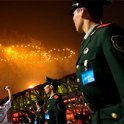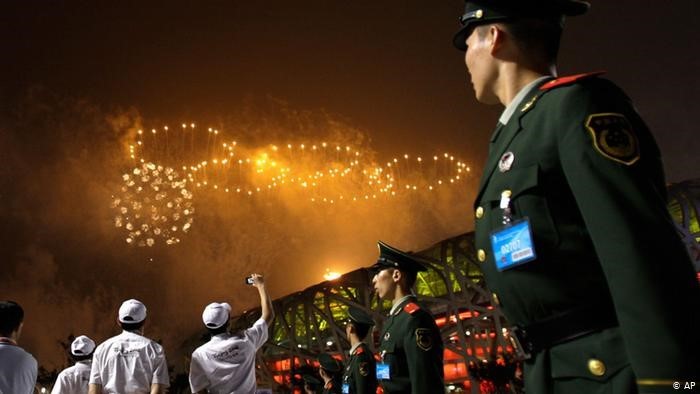Global Risk Perspectives - Monthly insights on geopolitics, trade & climate
Back to articlesBernardo Pires de Lima 

18.06.2021
The geopolitics of sports
It feels like yesterday, but it's been 13 years. Let's go back to 2008, a year of major course corrections in the post-Cold War period. In the US, the subprime bubble had already burst and given way to the greatest financial cataclysm in the West since the Great Depression of the 1920s. COVID-19 has now put that in perspective, historically speaking. At the same time, Russia had kicked off their summer by invading Georgia, venting their imperial testosterone all over the Caucasus in an effort to deter NATO's eastward expansion. Let us admit their move worked. In Beijing, the Olympics provided the ruling powers with apotheosis. China began to express itself in far more ambitious and disruptive terms. This is no accident. Mega-events in the realm of sports increasingly provide a geopolitical reading of the host nation. And a tool for exporting power.
At first blush there's nothing wrong with that. When it comes to international politics, you play your hand to the best of your ability. The rot lies in the nebulous process to determine who hosts what and, if you look downstream, the questionable management of the millions that sustain those events. Just follow the worsening controversies with the International Olympic Committee or within FIFA and you’ll get a measure of the poor transparency and back-room deals that their leadership structures engage in. And then there's the endemic corruption in the very backbone of regimes that have hosted major sporting events. Recall, if you will, the Winter Olympics in Sochi, Russia, 2014, and the 25-billion Euro overrun at the pleasure of a business cohort that orbits Putin. Many in that group are key players in the Kremlin's hierarchy. Let us not forget, either, the political impacts of organizing and spending associated with the FIFA World Cup and the Olympics in Brazil, in 2014 and 2016, respectively.
Of course, co-opting major sporting events for political gain is nothing new. Simply hark back to the Berlin Olympics of 1936 and the Committee arguing that Germany should be welcomed back into the international community after World War I, the Nazi regime doing everything in its power to maximize a sanguine display of its political project. Opponents of the regime also saw an opportunity to humiliate Hitler through the performance of African-Americans Jesse Owens, Ralph Metcalfe, Archibald Williams, John Woodruff or Cornelius Johnson, all of them gold medallists.
During the Cold War, the Olympics constituted a stage for political affirmation or abjuration. The Soviet Union boycotted several outings up until 1952, and later recused itself from the 1984 Olympics in Los Angeles. As their opposite number, the USA (among a host of nations), boycotted the 1980 Moscow games. A semblance of normalcy returned when the Cold War ended and an easing of international tensions fed into the geopolitical use of mega-sporting events. However, it is perfectly possible to identify, say, in the figurative worship of physical performance by athletes of the former German Democratic Republic, an expression of the regime's rigidity; insofar as any Olympic win would further the war of ideologies. The same goes for Soviets, Chinese and Yugoslavians, as well as Americans or Israelites. It isn't meaningless that the 1972 massacre against the Israelite delegation took place in the Olympics. This was not only the first major sporting event in Germany since the end of WWII but also the first major media event where they flew the flag of Israel, and no less in the city where the Nazi party was founded — a clear signal that History had taken a new tack. Amplification via TV did the rest of the work.

More recently, the at-once spontaneous and tactful way the Croatian president inserted herself into the Croatian national team’s path toward the World Cup in Russia, and the impacts on Croatian society and her political ascent on the European stage speaks to sports as a continuation of policy and politics. I vividly remember the first images I associate with Croatia reflecting an international post-Yugoslavian personality founded on mass sports. That was in fact the strategy for Tudman, independent Croatia’s first president, who said that sports is "the first thing to tell nations apart after war”. I remember the last basketball game in the 1992 Olympics, won by the Dream Team, with Michael Jordan, Magic Johnson and Larry Bird. After that I followed Dražen Petrović as he ascended to thereto-unreachable stardom in the NBA and the commotion over his tragic passing, of which you can still witness the signs in modern-day Zagreb. Finally, there was the golden generation reaching the apex of major soccer competitions, first on the Euro 96 and then the 98 World Cup (placing 3rd), always centred around the magnificent, under-20 quintet who played for Yugoslavia in 1987 — Šuker, Boban, Jarni, Štimac e Prosinečki. It was sports that helped consolidate the Croatian state in a region beset by war.
In the meantime, the new geopolitics of sports incepted in Beijing 2008 took hold of the BRIC community, India excepted. Since then, South Africa has organized the 2010 World Cup, Brazil the 2014 Cup and the 2016 Olympics, Russia the Winter Olympics in 2014 and the World Cup in 2018, and Beijing will host the Winter Olympics in 2022, the year when Qatar, the hardest-working emirate on the political world stage, will organize the world's most expensive soccer cup, mired in investigations into bribery of FIFA delegates which have led to arrests. What is the common theme here? Budget overruns, ongoing corruption, political ostentation, international charm and glamour. What am I driving at? This: either the geopolitics of sport followed by the BRIC group serves to normalize those nations in the context of international relationships, or merely the petty goals and collusions among leaders and regimes to facilitate all sorts of schemes. I lean toward the latter being more likely and affecting the former. Beneath the "organization of excellence” thrives a perverse underworld that corrupts sports and host societies. In the end, we all lose when a few stand to profit.
Disclaimer: Bernardo Pires de Lima, research fellow with the Portuguese Institute of International Relations (Instituto Português de Relações Internacionais) at Nova University of Lisbon.
The views, thoughts and opinions expressed herein belong solely to the author and do not reflect the official positions or policies of, or obligate, any institution, organization or committee he may be affiliated with.
Bernardo Pires de Lima is Political Adviser to the President of the Portuguese Republic. He is also a Research Fellow at the Portuguese Institute of International Relations, IPRI-NOVA, an international politics analyst for the national Portuguese television channel RTP, for radio station Antena 1 and the Portuguese daily Diário de Notícias. He chairs the Luso-American Development Foundation’s (FLAD) Curators Council and has been a Research Fellow at the Johns Hopkins Center for Transatlantic Relations in Washington DC and at the National Defense Institute in Lisbon, Portugal. He has penned eight books on contemporary international politics, the most recent being Portugal na Era dos Homens Fortes: Democracia e Autoritarismo em Tempos de Covid (Portugal in a time of strongmen: Democracy and authoritarianism in a time of Covid), published by Tinta-da- China in September 2020.



